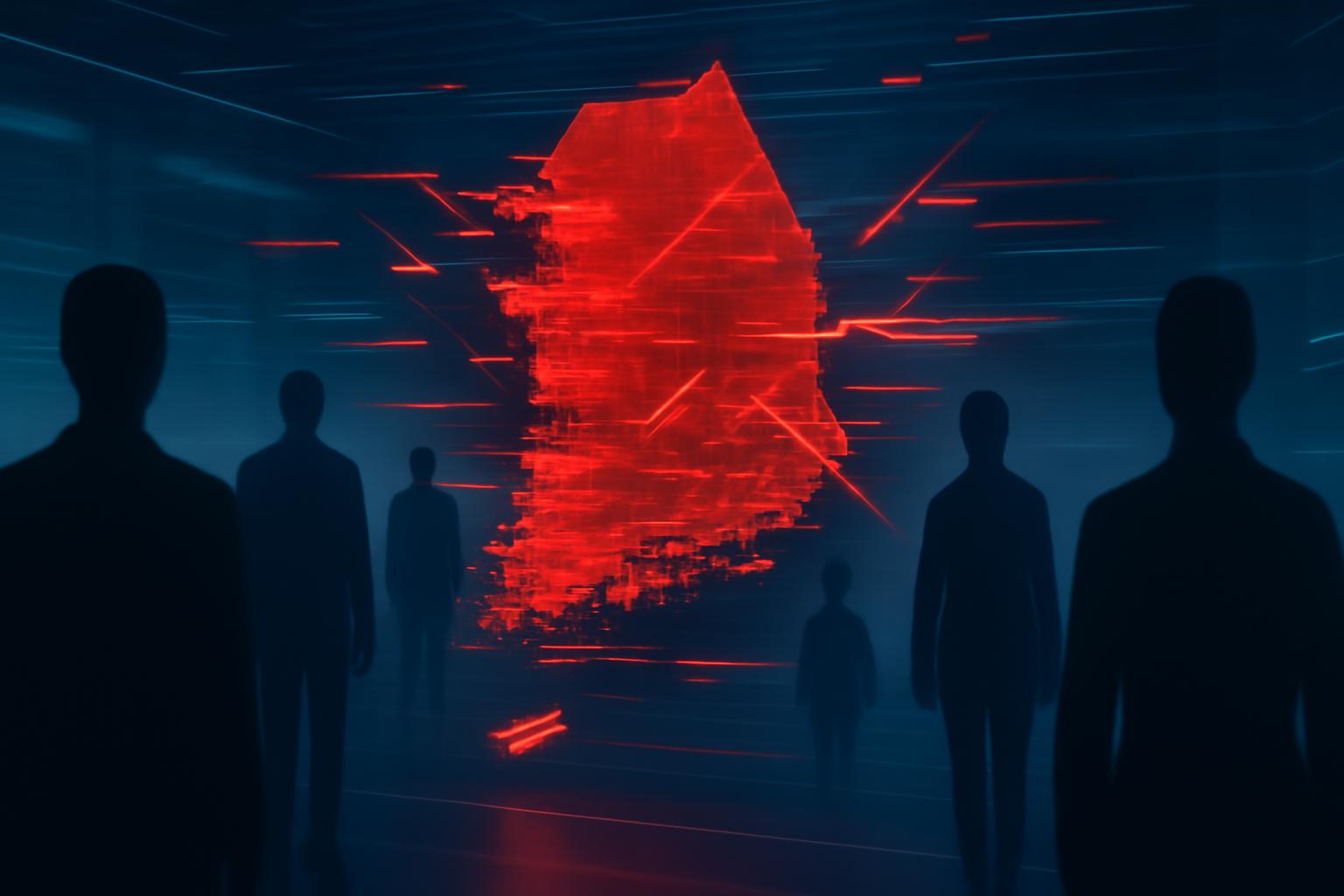South Korea’s recurring cyber incidents underscore critical vulnerabilities within its digital infrastructure and governance framework. The fragmented nature of cybersecurity oversight and the persistent shortage of skilled professionals impede the nation’s ability to mount a robust, proactive defense against evolving threats. !-- wp:paragraph -->
Contents
FinOracleAI — Market ViewFinOracleAI — Market ViewFinOracleAI — Market ViewGovernment Response and Future DirectionsFinOracleAI — Market ViewGovernment Response and Future DirectionsFinOracleAI — Market ViewChronology of Major Cyber Incidents in 2025Structural and Workforce ChallengesGovernment Response and Future DirectionsFinOracleAI — Market ViewChronology of Major Cyber Incidents in 2025Structural and Workforce ChallengesGovernment Response and Future DirectionsFinOracleAI — Market ViewSouth Korea’s Cybersecurity Under Pressure Amid Monthly BreachesChronology of Major Cyber Incidents in 2025Structural and Workforce ChallengesGovernment Response and Future DirectionsFinOracleAI — Market View
- Opportunities: Implementation of a centralized, coordinated cybersecurity framework could streamline responses and improve resilience.
- Risks: Political centralization risks politicizing cyber defense, potentially undermining transparency and effectiveness.
- Workforce Development: Prioritizing cybersecurity education and training is essential to break the cycle of talent scarcity.
- Advanced Threats: Increasing use of AI-driven attacks and state-sponsored espionage requires adaptive and innovative defense mechanisms.
- Regulatory Reform: Legal empowerment for early investigation can reduce response times but must balance privacy and oversight concerns.
FinOracleAI — Market View
South Korea’s recurring cyber incidents underscore critical vulnerabilities within its digital infrastructure and governance framework. The fragmented nature of cybersecurity oversight and the persistent shortage of skilled professionals impede the nation’s ability to mount a robust, proactive defense against evolving threats. !-- wp:paragraph -->- Opportunities: Implementation of a centralized, coordinated cybersecurity framework could streamline responses and improve resilience.
- Risks: Political centralization risks politicizing cyber defense, potentially undermining transparency and effectiveness.
- Workforce Development: Prioritizing cybersecurity education and training is essential to break the cycle of talent scarcity.
- Advanced Threats: Increasing use of AI-driven attacks and state-sponsored espionage requires adaptive and innovative defense mechanisms.
- Regulatory Reform: Legal empowerment for early investigation can reduce response times but must balance privacy and oversight concerns.
“A hybrid model with clear accountability and streamlined roles is essential for effective cyber defense,” Pak advised. The Ministry of Science and ICT, alongside KISA and other agencies, reaffirmed their commitment to countering sophisticated cyber threats and minimizing harm to businesses and citizens.
!-- wp:paragraph -->FinOracleAI — Market View
South Korea’s recurring cyber incidents underscore critical vulnerabilities within its digital infrastructure and governance framework. The fragmented nature of cybersecurity oversight and the persistent shortage of skilled professionals impede the nation’s ability to mount a robust, proactive defense against evolving threats. !-- wp:paragraph -->- Opportunities: Implementation of a centralized, coordinated cybersecurity framework could streamline responses and improve resilience.
- Risks: Political centralization risks politicizing cyber defense, potentially undermining transparency and effectiveness.
- Workforce Development: Prioritizing cybersecurity education and training is essential to break the cycle of talent scarcity.
- Advanced Threats: Increasing use of AI-driven attacks and state-sponsored espionage requires adaptive and innovative defense mechanisms.
- Regulatory Reform: Legal empowerment for early investigation can reduce response times but must balance privacy and oversight concerns.
“A hybrid model with clear accountability and streamlined roles is essential for effective cyber defense,” Pak advised. The Ministry of Science and ICT, alongside KISA and other agencies, reaffirmed their commitment to countering sophisticated cyber threats and minimizing harm to businesses and citizens.
!-- wp:paragraph -->FinOracleAI — Market View
South Korea’s recurring cyber incidents underscore critical vulnerabilities within its digital infrastructure and governance framework. The fragmented nature of cybersecurity oversight and the persistent shortage of skilled professionals impede the nation’s ability to mount a robust, proactive defense against evolving threats. !-- wp:paragraph -->- Opportunities: Implementation of a centralized, coordinated cybersecurity framework could streamline responses and improve resilience.
- Risks: Political centralization risks politicizing cyber defense, potentially undermining transparency and effectiveness.
- Workforce Development: Prioritizing cybersecurity education and training is essential to break the cycle of talent scarcity.
- Advanced Threats: Increasing use of AI-driven attacks and state-sponsored espionage requires adaptive and innovative defense mechanisms.
- Regulatory Reform: Legal empowerment for early investigation can reduce response times but must balance privacy and oversight concerns.
Government Response and Future Directions
In response to escalating cyber threats, South Korea’s Presidential Office National Security Office announced a comprehensive, cross-ministerial cybersecurity initiative. This strategy aims to establish a unified, whole-of-government response framework, with legal reforms enabling early government intervention in cyber incidents. !-- wp:paragraph --> However, concerns remain that concentrating authority within a presidential “control tower” risks politicization and overreach. Pak advocates for a balanced model combining centralized strategic coordination with independent oversight and technical execution by specialized agencies like KISA. !-- wp:paragraph -->“A hybrid model with clear accountability and streamlined roles is essential for effective cyber defense,” Pak advised. The Ministry of Science and ICT, alongside KISA and other agencies, reaffirmed their commitment to countering sophisticated cyber threats and minimizing harm to businesses and citizens.
!-- wp:paragraph -->FinOracleAI — Market View
South Korea’s recurring cyber incidents underscore critical vulnerabilities within its digital infrastructure and governance framework. The fragmented nature of cybersecurity oversight and the persistent shortage of skilled professionals impede the nation’s ability to mount a robust, proactive defense against evolving threats. !-- wp:paragraph -->- Opportunities: Implementation of a centralized, coordinated cybersecurity framework could streamline responses and improve resilience.
- Risks: Political centralization risks politicizing cyber defense, potentially undermining transparency and effectiveness.
- Workforce Development: Prioritizing cybersecurity education and training is essential to break the cycle of talent scarcity.
- Advanced Threats: Increasing use of AI-driven attacks and state-sponsored espionage requires adaptive and innovative defense mechanisms.
- Regulatory Reform: Legal empowerment for early investigation can reduce response times but must balance privacy and oversight concerns.
“Without enough expertise, it’s impossible to build and maintain the proactive defenses needed to stay ahead of threats,” Pak remarked, highlighting a vicious cycle of talent shortages and inadequate defenses. Political deadlock further encourages short-term fixes post-crisis, sidelining the essential long-term efforts required to bolster digital resilience.
!-- wp:paragraph -->Government Response and Future Directions
In response to escalating cyber threats, South Korea’s Presidential Office National Security Office announced a comprehensive, cross-ministerial cybersecurity initiative. This strategy aims to establish a unified, whole-of-government response framework, with legal reforms enabling early government intervention in cyber incidents. !-- wp:paragraph --> However, concerns remain that concentrating authority within a presidential “control tower” risks politicization and overreach. Pak advocates for a balanced model combining centralized strategic coordination with independent oversight and technical execution by specialized agencies like KISA. !-- wp:paragraph -->“A hybrid model with clear accountability and streamlined roles is essential for effective cyber defense,” Pak advised. The Ministry of Science and ICT, alongside KISA and other agencies, reaffirmed their commitment to countering sophisticated cyber threats and minimizing harm to businesses and citizens.
!-- wp:paragraph -->FinOracleAI — Market View
South Korea’s recurring cyber incidents underscore critical vulnerabilities within its digital infrastructure and governance framework. The fragmented nature of cybersecurity oversight and the persistent shortage of skilled professionals impede the nation’s ability to mount a robust, proactive defense against evolving threats. !-- wp:paragraph -->- Opportunities: Implementation of a centralized, coordinated cybersecurity framework could streamline responses and improve resilience.
- Risks: Political centralization risks politicizing cyber defense, potentially undermining transparency and effectiveness.
- Workforce Development: Prioritizing cybersecurity education and training is essential to break the cycle of talent scarcity.
- Advanced Threats: Increasing use of AI-driven attacks and state-sponsored espionage requires adaptive and innovative defense mechanisms.
- Regulatory Reform: Legal empowerment for early investigation can reduce response times but must balance privacy and oversight concerns.
Chronology of Major Cyber Incidents in 2025
- January: GS Retail’s website breach exposed personal data of approximately 90,000 customers.
- February: Wemix, blockchain division of Wemade, suffered a $6.2 million hack, disclosed days later.
- April-May: Albamon job platform leaked 20,000 user resumes; SK Telecom’s breach compromised data of 23 million customers.
- June: Yes24 ransomware attack disrupted services for four days.
- July: North Korea-linked Kimsuky group launched AI-driven deepfake spear-phishing; Seoul Guarantee Insurance hit by ransomware crippling key financial services.
- August: Multiple attacks including a second Yes24 ransomware event, Lotte Card data breach affecting 3 million customers, and Welrix F&I ransomware attack with data leaked on the dark web.
- September: KT telecom’s subscriber data breach linked to fake base stations; ongoing espionage on foreign embassies by Kimsuky.
Structural and Workforce Challenges
Brian Pak, CEO of Seoul-based cybersecurity firm Theori and advisor to SK Telecom’s cybersecurity committee, emphasizes that South Korea’s cybersecurity approach remains reactive rather than proactive. This reactive stance, coupled with siloed government agencies, impedes workforce development and strategic defense initiatives. !-- wp:paragraph -->“Without enough expertise, it’s impossible to build and maintain the proactive defenses needed to stay ahead of threats,” Pak remarked, highlighting a vicious cycle of talent shortages and inadequate defenses. Political deadlock further encourages short-term fixes post-crisis, sidelining the essential long-term efforts required to bolster digital resilience.
!-- wp:paragraph -->Government Response and Future Directions
In response to escalating cyber threats, South Korea’s Presidential Office National Security Office announced a comprehensive, cross-ministerial cybersecurity initiative. This strategy aims to establish a unified, whole-of-government response framework, with legal reforms enabling early government intervention in cyber incidents. !-- wp:paragraph --> However, concerns remain that concentrating authority within a presidential “control tower” risks politicization and overreach. Pak advocates for a balanced model combining centralized strategic coordination with independent oversight and technical execution by specialized agencies like KISA. !-- wp:paragraph -->“A hybrid model with clear accountability and streamlined roles is essential for effective cyber defense,” Pak advised. The Ministry of Science and ICT, alongside KISA and other agencies, reaffirmed their commitment to countering sophisticated cyber threats and minimizing harm to businesses and citizens.
!-- wp:paragraph -->FinOracleAI — Market View
South Korea’s recurring cyber incidents underscore critical vulnerabilities within its digital infrastructure and governance framework. The fragmented nature of cybersecurity oversight and the persistent shortage of skilled professionals impede the nation’s ability to mount a robust, proactive defense against evolving threats. !-- wp:paragraph -->- Opportunities: Implementation of a centralized, coordinated cybersecurity framework could streamline responses and improve resilience.
- Risks: Political centralization risks politicizing cyber defense, potentially undermining transparency and effectiveness.
- Workforce Development: Prioritizing cybersecurity education and training is essential to break the cycle of talent scarcity.
- Advanced Threats: Increasing use of AI-driven attacks and state-sponsored espionage requires adaptive and innovative defense mechanisms.
- Regulatory Reform: Legal empowerment for early investigation can reduce response times but must balance privacy and oversight concerns.
Chronology of Major Cyber Incidents in 2025
- January: GS Retail’s website breach exposed personal data of approximately 90,000 customers.
- February: Wemix, blockchain division of Wemade, suffered a $6.2 million hack, disclosed days later.
- April-May: Albamon job platform leaked 20,000 user resumes; SK Telecom’s breach compromised data of 23 million customers.
- June: Yes24 ransomware attack disrupted services for four days.
- July: North Korea-linked Kimsuky group launched AI-driven deepfake spear-phishing; Seoul Guarantee Insurance hit by ransomware crippling key financial services.
- August: Multiple attacks including a second Yes24 ransomware event, Lotte Card data breach affecting 3 million customers, and Welrix F&I ransomware attack with data leaked on the dark web.
- September: KT telecom’s subscriber data breach linked to fake base stations; ongoing espionage on foreign embassies by Kimsuky.
Structural and Workforce Challenges
Brian Pak, CEO of Seoul-based cybersecurity firm Theori and advisor to SK Telecom’s cybersecurity committee, emphasizes that South Korea’s cybersecurity approach remains reactive rather than proactive. This reactive stance, coupled with siloed government agencies, impedes workforce development and strategic defense initiatives. !-- wp:paragraph -->“Without enough expertise, it’s impossible to build and maintain the proactive defenses needed to stay ahead of threats,” Pak remarked, highlighting a vicious cycle of talent shortages and inadequate defenses. Political deadlock further encourages short-term fixes post-crisis, sidelining the essential long-term efforts required to bolster digital resilience.
!-- wp:paragraph -->Government Response and Future Directions
In response to escalating cyber threats, South Korea’s Presidential Office National Security Office announced a comprehensive, cross-ministerial cybersecurity initiative. This strategy aims to establish a unified, whole-of-government response framework, with legal reforms enabling early government intervention in cyber incidents. !-- wp:paragraph --> However, concerns remain that concentrating authority within a presidential “control tower” risks politicization and overreach. Pak advocates for a balanced model combining centralized strategic coordination with independent oversight and technical execution by specialized agencies like KISA. !-- wp:paragraph -->“A hybrid model with clear accountability and streamlined roles is essential for effective cyber defense,” Pak advised. The Ministry of Science and ICT, alongside KISA and other agencies, reaffirmed their commitment to countering sophisticated cyber threats and minimizing harm to businesses and citizens.
!-- wp:paragraph -->FinOracleAI — Market View
South Korea’s recurring cyber incidents underscore critical vulnerabilities within its digital infrastructure and governance framework. The fragmented nature of cybersecurity oversight and the persistent shortage of skilled professionals impede the nation’s ability to mount a robust, proactive defense against evolving threats. !-- wp:paragraph -->- Opportunities: Implementation of a centralized, coordinated cybersecurity framework could streamline responses and improve resilience.
- Risks: Political centralization risks politicizing cyber defense, potentially undermining transparency and effectiveness.
- Workforce Development: Prioritizing cybersecurity education and training is essential to break the cycle of talent scarcity.
- Advanced Threats: Increasing use of AI-driven attacks and state-sponsored espionage requires adaptive and innovative defense mechanisms.
- Regulatory Reform: Legal empowerment for early investigation can reduce response times but must balance privacy and oversight concerns.
South Korea’s Cybersecurity Under Pressure Amid Monthly Breaches
South Korea, renowned globally for its ultra-fast internet and digital innovation hubs like Hyundai, LG, and Samsung, is confronting a surge in cyberattacks that question the resilience of its cybersecurity infrastructure. Despite advanced digital capabilities, the country faces persistent breaches affecting critical sectors including finance, telecommunications, and government. !-- wp:paragraph --> Experts point to a fragmented cybersecurity governance model, which slows response times and undermines coordinated action. The absence of a designated governmental “first responder” agency leaves the nation vulnerable to increasingly sophisticated threats. !-- wp:paragraph -->Chronology of Major Cyber Incidents in 2025
- January: GS Retail’s website breach exposed personal data of approximately 90,000 customers.
- February: Wemix, blockchain division of Wemade, suffered a $6.2 million hack, disclosed days later.
- April-May: Albamon job platform leaked 20,000 user resumes; SK Telecom’s breach compromised data of 23 million customers.
- June: Yes24 ransomware attack disrupted services for four days.
- July: North Korea-linked Kimsuky group launched AI-driven deepfake spear-phishing; Seoul Guarantee Insurance hit by ransomware crippling key financial services.
- August: Multiple attacks including a second Yes24 ransomware event, Lotte Card data breach affecting 3 million customers, and Welrix F&I ransomware attack with data leaked on the dark web.
- September: KT telecom’s subscriber data breach linked to fake base stations; ongoing espionage on foreign embassies by Kimsuky.
Structural and Workforce Challenges
Brian Pak, CEO of Seoul-based cybersecurity firm Theori and advisor to SK Telecom’s cybersecurity committee, emphasizes that South Korea’s cybersecurity approach remains reactive rather than proactive. This reactive stance, coupled with siloed government agencies, impedes workforce development and strategic defense initiatives. !-- wp:paragraph -->“Without enough expertise, it’s impossible to build and maintain the proactive defenses needed to stay ahead of threats,” Pak remarked, highlighting a vicious cycle of talent shortages and inadequate defenses. Political deadlock further encourages short-term fixes post-crisis, sidelining the essential long-term efforts required to bolster digital resilience.
!-- wp:paragraph -->Government Response and Future Directions
In response to escalating cyber threats, South Korea’s Presidential Office National Security Office announced a comprehensive, cross-ministerial cybersecurity initiative. This strategy aims to establish a unified, whole-of-government response framework, with legal reforms enabling early government intervention in cyber incidents. !-- wp:paragraph --> However, concerns remain that concentrating authority within a presidential “control tower” risks politicization and overreach. Pak advocates for a balanced model combining centralized strategic coordination with independent oversight and technical execution by specialized agencies like KISA. !-- wp:paragraph -->“A hybrid model with clear accountability and streamlined roles is essential for effective cyber defense,” Pak advised. The Ministry of Science and ICT, alongside KISA and other agencies, reaffirmed their commitment to countering sophisticated cyber threats and minimizing harm to businesses and citizens.
!-- wp:paragraph -->FinOracleAI — Market View
South Korea’s recurring cyber incidents underscore critical vulnerabilities within its digital infrastructure and governance framework. The fragmented nature of cybersecurity oversight and the persistent shortage of skilled professionals impede the nation’s ability to mount a robust, proactive defense against evolving threats. !-- wp:paragraph -->- Opportunities: Implementation of a centralized, coordinated cybersecurity framework could streamline responses and improve resilience.
- Risks: Political centralization risks politicizing cyber defense, potentially undermining transparency and effectiveness.
- Workforce Development: Prioritizing cybersecurity education and training is essential to break the cycle of talent scarcity.
- Advanced Threats: Increasing use of AI-driven attacks and state-sponsored espionage requires adaptive and innovative defense mechanisms.
- Regulatory Reform: Legal empowerment for early investigation can reduce response times but must balance privacy and oversight concerns.













